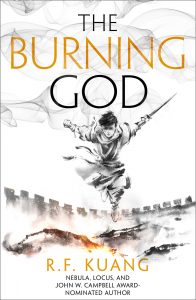The Burning God by R. F. Kuang—Book Review
Published by: Harper Voyager
Genre: Military Fantasy
Pages: 617
Format: Paperback
Purchased Copy: At my local bookstore. Support your bookstores, folks!
 The Burning God is a triumph. Rebecca Kuang’s conclusion to her debut trilogy, The Poppy War, is testament to her growth as a writer; not only is it a fitting close to an ambitious series, it is the absolute high-point of a journey that began with an ambitious girl looking to better her life and ended with a broken young woman shaping the future of an entire nation.
The Burning God is a triumph. Rebecca Kuang’s conclusion to her debut trilogy, The Poppy War, is testament to her growth as a writer; not only is it a fitting close to an ambitious series, it is the absolute high-point of a journey that began with an ambitious girl looking to better her life and ended with a broken young woman shaping the future of an entire nation.
There’s something of a cautionary tale to Fang Runin, the singular force of nature that is our protagonist. Though she wields the fire of the Phoenix, she has served always as the agent of others. Rin has been used as a weapon, has thought of herself as a weapon, for all her adult life—over the two years of war and strife, first against the Muganese, then against her fellow Nikans in the civil war that has torn Nikan asunder. Mass forced migration, food shortages, and a hundred other tragedies brought about by conflict are given voice in the pages of The Burning God; and, oh, how powerful they are, how sobering in their quotidian nature.
The personal cost is no less horrifying. I half-jokingly noted on Goodreads, about a sixth into the book, that “I love Rin but she’s psychotic”—after taking stock of the book in full, this isn’t far from the truth. Rin’s scars go much deeper than just the physical ones (and the book opens with a pretty huge revelation in this department); she has been used and abused, experimented on and betrayed, denied just about every human comfort at one time or another. Kuang’s protagonist houses such fury within herself, a white-hot rage that she makes manifest to disintegrate her enemies. To survive, she has had to fashion herself after monsters, and to bury her conscience below a river of screams, below a dozen excuses all of which ring hollow:
It didn’t matter that they looked like boys. That they were nothing, nothing like the monsters she had once known…If they were Muganese, that meant they were crickets and that meant when she crushed them under her heel, the universe hardly registered their loss.
You can hardly even blame her, not if you recall the horrors she has experienced. But protagonist or not, it’s not difficult to penetrate through the lies Rin tells herself to keep alive.
While the action is spectacular (it truly is!), and the strategy and tactics deployed here are beyond gripping, what interests me most is the human cost of this war. The intricate relationships that in so many ways define our protagonist and her closest friends—Kitay, Venka, Nezha—and the way they develop over these six-hundred pages exemplify that full, horrible price. Violence against one aggressor or another is a downward spiral; no matter the reasons for fighting, no matter how noble or petty they may be, they only spawn further violence.
The author illustrates this through stunning imagery—my copy of the Harper Voyager paperback is chock-full of underlined passages and notes. I recall enjoying The Poppy War a great deal but there was a rough edge to some of the dialogue and descriptions, ever so slight but noticeable. The Dragon Republic smoothed that over but this third novel is a cornucopia of well-written prose. Reading this book with care and attention is a feast for the mind—The Burning God is the kind of title that will lit an ambitious spark in your eyes, make you strive to be a better writer.
It is a spectacular work—perhaps my favourite release of 2020. Bittersweet does not begin to describe its final hundred pages or so; it’ll long linger on in my memory. I suspect I’ll make my return to Nikara for many years to come—there is much to draw from here.
After one hell of an opening act, I am eager to see what Rebecca Kuang comes up with next.

[…] If you prefer reading to video, Filip also posted a review of Rebecca Kuang’s masterful finale of The Poppy War last month, which you can find here. […]